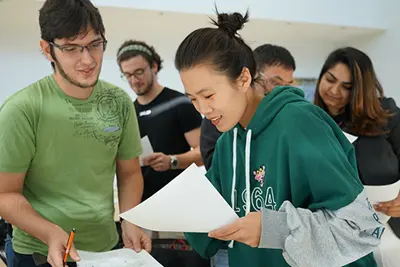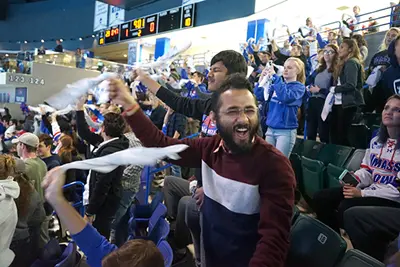Multicultural Affairs Provides Support Through College and Beyond
 Image by K. Webster
Image by K. Webster
04/01/2020
By Katharine Webster
At Lowell High School, Ricardo Candanedo was in the federal GEAR UP program, which helps low-income, high-achieving students prepare for college. He got lots of individual mentoring and advice.
When Candanedo started at UMass Lowell as a computer engineering major, he got a campus job in the Office of Multicultural Affairs – and an invitation to join a new program that would provide him with the same kind of individual help for all four years here: River Hawk Rising.
Now a junior, Candanedo says that he benefited from weekly workshops that introduced him and other students to staff and support programs across the university, from Career & Co-op Services to the Centers for Learning and Academic Support Services (CLASS). He made good friends, too.
But the best part was – and is – his individual check-in with Elsie Otero, associate director of Multicultural Affairs, every two weeks.
“The connection with staff in Multicultural Affairs, just that one-on-one, is hard to find in a big university like this, and it’s a big help,” he says. “I’ve definitely gone to Elsie for a number of different things: financial, emotional or anything else. She’s my first go-to person if I have questions about anything.”
That individual connection can be key for students who come here through college access programs like GEAR UP, TRIO and Upward Bound at urban public and charter schools. Most come from low-income families and are students of color. Nearly all of them are first-generation college students.
When these students arrive on campus, they may not know how to access the resources – financial, academic and personal – that will help them stay on track. Otero piloted River Hawk Rising four years ago to address that gap, starting with three students. Seventeen students, including Candanedo, joined in the second year, and the program has expanded each year since.
“The goal is to provide students with support throughout their four years here and set them up for success here and beyond,” Otero says. “It’s aimed at diverse students who may have had structured support and individual attention in high school and are looking for that here.”
River Hawk Rising brings those resources and services to first-year students through weekly workshops. Staff and faculty from around the university teach study skills and time management. They show students how to check their academic progress – and make sure that they know where to get help. They encourage involvement in student clubs and organizations and talk about mental, physical and financial well-being.
Now, with the near-total closure of campus to mitigate the spread of COVID-19, Otero is checking in with students by phone or videoconference and sending them periodic emails directing them to key campus resources, including online tutoring and online workshops sponsored by Career & Co-op Services, among other offices.
 Image by K. Webster
Image by K. Webster
Juana Guerrero, a sophomore nursing major from Lawrence and a first-generation college student who is also in the Honors College, says she’s never needed academic support. Instead, Guerrero applied to River Hawk Rising for help with campus resources and networking.
“I’m a little shy,” she says. “If I wanted to succeed, I knew I needed some kind of group that would keep me in that shape. Also, because the program is run by Multicultural Affairs, I knew I’d meet diverse students from similar backgrounds.”
Now, Guerrero works for Multicultural Affairs as a peer liaison and tutor for first-year health sciences students in the program who need help with their required course, Human Anatomy and Physiology.
For the first time last summer, River Hawk Rising added a three-day orientation for 84 first-year and transfer students. They moved into housing early and got a crash course in navigating the university.
Lana Bashir, a first-generation college student from Boston, says she learned lots of different techniques to deal with stress and stay motivated. She also made great friends.
“I’m a people person, so I like to get involved, but I was scared being a freshman, because I never really had to be on my own for anything before,” she says. “I found my group.”
Then, when Bashir began to question her initial choice of major, exercise science, Otero helped her transition to the Bachelor of Liberal Arts program, which allows her to combine her health studies classes with coursework in psychology, sociology and Arabic.
“If I hadn’t talked to Elsie, I’d still be struggling in the program,” Bashir says.
In students’ sophomore, junior and senior years, Otero and the other River Hawk Rising “coaches” in Multicultural Affairs help students think about their goals beyond college and develop a plan to reach them. Otero says many participants don’t realize until too late about the importance of experiences, including research, internships or professional co-ops, that will prepare them for graduate school or a career.
Senior biomedical engineering major and Honors College student Michelle Nguyen, who in May will become the first River Hawk Rising Scholar to graduate and is applying to graduate programs now, says that help from Otero was instrumental in preparing her to succeed.
“A lot of things I’ve been able to accomplish were not even on my radar before I came here,” she says.
Students who don’t initially participate in River Hawk Rising but want support after their first year can apply to join the program. That includes transfer students and students who complete River Hawk Scholars Academy, a larger support program for first-year, first-generation college students.




